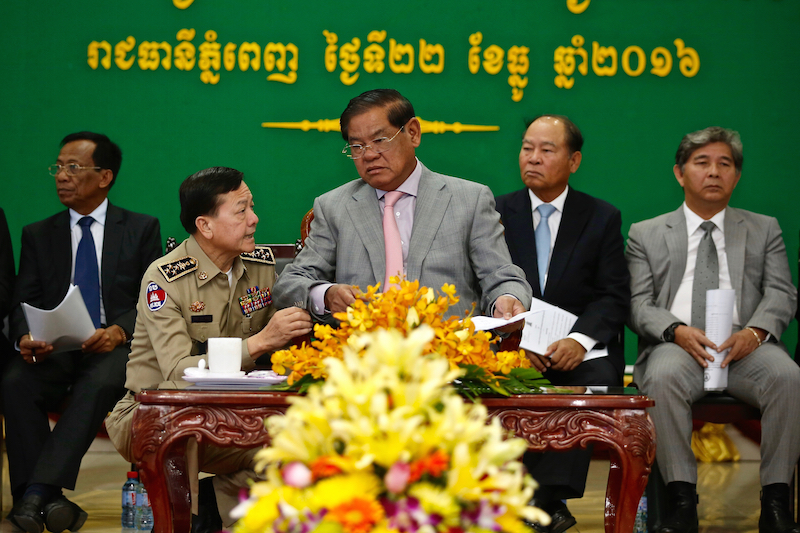The National Assembly has rejected a request from the head of its human rights committee to summon Interior Minister Sar Kheng for questioning over the government’s investigation into the July murder of political analyst Kem Ley, which many believe was a state-sponsored hit.
Leng Peng Long, head of the National Assembly secretariat, said on Thursday that Assembly President Heng Samrin would not endorse a letter from opposition lawmaker Eng Chhay Eang calling Mr. Kheng to parliament.

“Samdech President [Mr. Samrin] already made a decision, deciding not to send the letter to the government summoning Interior Minister Sar Kheng because the case of Kem Ley has been in the hands of the court for a long time—since the beginning—so the minister and the Royal Government do not know anything more about this,” Mr. Peng Long said.
Interior Ministry spokesman Khieu Sopheak said it was also a matter of not giving the CNRP an opportunity to win political points by pressing the government over a murder that gave rise to an outpouring of public grief and suspicion.
“If Sar Kheng goes there, it’s just only the show made by the CNRP to gather the public opinion that they want justice for Kem Ley,” he said, noting that many in the opposition party were wary of Kem Ley’s political intentions in the months leading up to his death.
“So when Kem Ley dies, they want to profit off the corpse of Kem Ley for their political mission,” General Sopheak said. He added that efforts to press Mr. Kheng on the issue could lead to a quick deterioration of a political detente between the CPP and CNRP.
“For my personal idea, when Sar Kheng go to be chopped, it will make the political climate in Cambodia become warmer and warmer,” Gen. Sopheak said.
“Of course Sar Kheng can go, but you know the people under Sar Kheng will not be happy when they see Eng Chhay Eang question Sar Kheng,” he added. “Because Sar Kheng and Hun Sen, they are the same: Hun Sen never bows in front of his opposition party.”
Mr. Chhay Eang, a senior opposition lawmaker and chairman of the National Assembly’s human rights committee, declined to comment on the rejection until he received an official document. He said earlier in the day that he also planned to summon Justice Minister Ang Vong Vathana over the case.
“It’s a big case and it’s very important to hear from the two ministers about the latest developments because it will be a model for law enforcement in Cambodia,” he said. “Because there must be justice for the dead victim.”
Lao Mong Hay, a political analyst and former legal adviser to the CNRP, said there was a clause in the National Assembly’s standing orders that allowed the government to decline to discuss cases that were before the court.
He said that a more effective way to press the government for answers about its investigation into Kem Ley’s murder would be by gathering “friends and sympathizers” to seek information from the government.
Mr. Mong Hay, an associate and friend of Kem Ley, said protests could be held near the gas station where Kem Ley was fatally shot, or in the streets where his body was carried away and where tens of thousands later turned out for his funeral procession.
Apart from surveillance footage of the shooting, which the government has refused to release, he said there were various leads that any proper investigator would be pursuing.
Among them are a photograph of Kem Ley sitting at the gas station’s cafe after being shot, but still sitting upright in his chair—a contrast to the images that would later emerge of him lying in a pool of blood on the floor.
“Who took that photo and the circumstances?” he said. “And why and how did he fall down? And who posted it to Facebook? This person can be traced, you see,” Mr. Mong Hay said. “There are a number of good leads.”
“I know this might be a bit sensitive,” he added. “I think push the government to seek justice…and then it’s the duty of the survivors—the living—to find justice for the dead.”